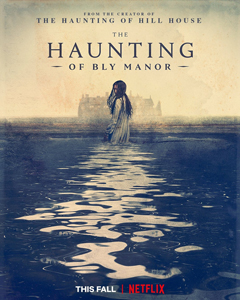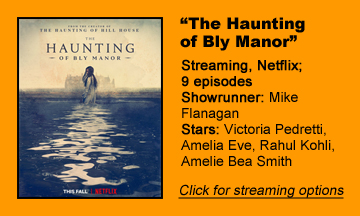With “The Haunting of Bly Manor” (Netflix) – his spiritual (pun intended) sequel to 2018’s “The Haunting of Hill House” — Mike Flanagan continues to solidify his status as a horror auteur tapped into the tragic beauty afforded by the genre.
A damp, dark-haired, white-dressed, hidden-faced woman in a Flanagan work is more than a scary ghost: She symbolizes the bittersweet tragedy of a forgotten past. (SPOILERS FOLLOW.)
Another turn of the screw
Based on Henry James’ 1898 novella “The Turn of the Screw,” “Bly Manor” ultimately takes a positive turn – closing on one lover who has not forgotten the other – but overall this is a sad, affecting nine episodes of TV.
That’s no different from “Hill House,” but the emphasized genre is different. Indeed, Julia Bicknell’s teleplay for the finale, “The Beast in the Jungle,” finds the narrator (Carla Gugino) apologizing to her listeners at a wedding party for pitching this tale as a ghost story; it’s actually a love story.
As we were trained to do by “Hill House,” the early episodes at Britain’s 1987-era Bly Manor had me searching the backgrounds of frames for ghosts. I spotted a few, but I sense that Flanagan holds back, maybe to dodge an internal cliché.
By the series’ back half, there are no background ghosts, because as it turns out (almost?) everyone is fictional, a “ghost” in the imagination of Gugino’s character, revealed to be an older Jamie (Amelia Eve).
Perfect Pedretti
So the ghosts are foregrounded in this second “Haunting,” and that’s less scary, but I adore this cast (most of whom return from “Hill House”). As the de-facto main character, American au pair Dani, Victoria Pedretti does heart-achingly good work.
A former teacher, Dani is supposedly great with kids, but Pedretti makes Dani’s smiles a bit forced, and we can see she’s a tad uncomfortable when she has to discipline her charges, 10-year-old Miles (Benjamin Evan Ainsworth) and 8-year-old Flora (Amelie Bea Smith).
Both young actors are excellent, but Smith’s acting especially paces Pedretti’s as Flora takes her new nanny around the grounds and says everything is “perfectly splendid.” But she’s hiding her concern over the Lady in the Lake who has killed the previous au pair, Rebecca (Tahirah Sharif).
It’s a pleasure to see “I, Zombie’s” Rahul Kohli get another great role, buried behind a mustache and glasses as Bly Manor cook Owen, whose off-screen mother has dementia.
Owen shares a bond with T’Nia Miller’s Hannah, a likewise too-good-for-this-job housekeeper who never complains about being too good. I don’t mind the cutaways to Uncle Henry (Henry Thomas) in his London office, and we learn in “The Jolly Corner” (6) why he so aggressively stays out of Flora’s and Miles’ lives.
Emerging chemistry
But the gradually emerging standout among the supporting cast is Eve as groundskeeper Jamie. “The Two Faces, Part One” (3) ends with hand-holding between Dani and Jamie that totally took me off guard (something I’d probably be embarrassed about on a rewatch, like revisiting those early Willow-Tara scenes on “Buffy”).

The chemistry crackles between Eve and Pedretti in later episodes; Jamie’s monolog to Dani that ties her backstory (a tragic one, would you believe it?) in with the rarely blooming moonflower impressively breaks the “show, don’t tell” rule.
While it’s clear enough what Flanagan and his team are doing – exploring the tragedy of dementia by using ghosts and memory-hopping – “Bly Manor” leaves room for quibbles about its execution (whereas “Hill House” was nearly flawless).
Certainly, this go-around includes masterpieces: “The Way It Came” (4) reveals that Dani is haunted by her deceased fiancé (Roby Attal’s Edmund), who gets hit by a bus in the process of storming away after Dani reveals that while she loves him, her sexual orientation doesn’t align with his.
And “The Romance of Certain Old Clothes” (8) brings in Kate Siegel as Viola – the manor’s matriarch of ancient days — whose (accidentally?) timely story of illness-driven isolation from her family is gorgeously narrated by Gugino. The episode reminds me of “The Lighthouse” if you keep the artistry but make the despair less all-encompassing.
Missing the mark
But it can’t be denied that some episodes miss the mark. My primary feeling when watching “The Altar of the Dead” (5) was confusion, and even though I figured out that “Oh, Hannah is a ghost who is jumping through her memories” by the end, it maybe should’ve been more about Owen’s and Hannah’s love story that never got to be.
“The Two Faces, Part Two” (7) is still rougher, as it chronicles the two weakest characters — and the lone case of a pairing without chemistry — Rebecca and Peter (Oliver Jackson-Cohen).
“Bly Manor’s” denouement is a misfire. Although the Dani-Jamie story is wonderful, the timeline gets messy when we cut back to Older Jamie’s narration; this should’ve been when everything snaps into place. It’s revealed (I think) that Jamie has made this story up in the tradition of Keyser Soze; she flat out tells one questioner that Bly Manor will not be found by someone looking for it.
Comparing Gugino’s age and gray-haired look to Eve’s, the framing narration takes place in present day. But it’s at the wedding of a woman whose middle name is Flora, suggesting that this is the grown-up Flora. But in present day, she would be about 40, not a bride who appears to be no more than 30; also, it’s unexplained why Flora’s British accent would be gone.
But at the wedding dance, Owen is interposed in Jamie’s gaze over one of the story’s listeners, returning us to the notion that Jamie made up the story.
Stolen song
Then Jamie leaves her hotel room door open a crack, “waiting” for Dani, so it seems that part of the story is real. Most irksome to me, “Bly Manor” closes with Sheryl Crow’s 1993 tearjerker “I Shall Believe,” which forever became the song of “Roswell’s” Max and Liz in 2000. Every time a movie or TV show co-opts that song, I’m taken out of the story.
But I think it’s worse here because The Newton Brothers – the composers who are a driving force behind the series’ mood, especially in episode eight – get bumped in favor of a song that (even if you’ve never heard of “Roswell”) isn’t quite right. Dani and Jamie deserve a song of their own.
I don’t mind the story’s shift in emphasis from horror to tragic love, since the actors carry Flanagan through that risky about-face. And this series has enough to say about the tragedy of dementia that I might dig deeper into essays and “‘Bly Manor,’ Explained” videos.
But it’s an unfortunate irony that “The Haunting of Bly Manor” itself has a case of drifting memory, venturing too far from its core identity to be totally, perfectly splendid.


